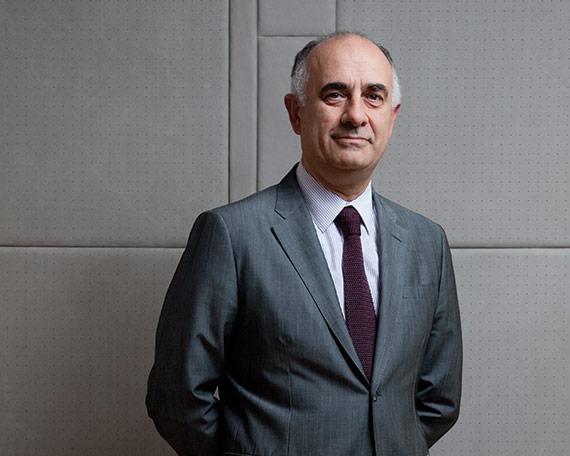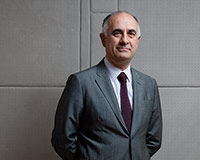
Klépierre is standing its ground. The French shopping centre giant has always staunchly resisted investing in the UK. And when it comes to whether this will change any time soon, the answer – a resounding “non” – could not be any clearer.
“We’re not in the UK and the strategy of Klépierre has always been to reinforce positions where we are strong already,” says Laurent Morel, chairman of the executive board of the €15bn (£11bn) real estate investment company.
But in a fluid global real estate market, the company’s lack of interest in this side of the Channel does not mean its future strategy is of no concern to the British property sector – particularly as European markets shift so quickly.
With a portfolio boasting more than £21bn of shopping centres in France, Italy, Spain, eastern Europe and Scandinavia, the group is second only to Franco-Dutch rival Unibail-Rodamco in size in the sector. In short, public statements from Klépierre could have the power to change the course of the entire European retail market.
Takeover
All eyes have been on the group since its £5.7bn takeover of Dutch investor Corio last year. Since then, Klepierre’s shopping centre rental income has risen by 2.8% to £508m and, in July this year, the group raised its 2015 earnings outlook, reporting that it expected net cash flow per share of €2.15 as opposed to €2.10 as originally anticipated.
Following the purchase, the business sold nine of its new assets for around €770m to Dutch real estate investment company Wereldhave. Why? “Because those assets don’t deliver the growth of the rest,” shrugs Morel. “So on average we improve our capacity to grow by selling those assets.”
But could this move be seen as a lack of faith in the stalled Dutch economy? Absolutely not, says Morel. He says: “We did it the year before in the Nordics, and we did it in France on a Carrefour deal. Selling a part of the portfolio enhances the capacity of the rest to grow.”
That Carrefour deal he mentions was the largest disposal of what Morel calls an asset rotation programme. The sale of 130 properties to the retailer Carrefour saw Klépierre exit all but 15 hypermarkets across France.
“Again, it was not against the idea of hypermarkets,” he says. “It was just that, inside this submarket, we had determined that some geographies offered more growth than others.”
Morel uses all of these examples to demonstrate, once again, that the sale of new assets after the Corio takeover should not be misunderstood as a negative stance on the Dutch market. “We liked the market in Holland because of its growing population,” he insists.
Wealthy regions
But the UK market? He is not so much of a fan. And that looks unlikely to change any time soon. Klépierre’s strategy may be to focus on wealthy regions in Europe, but for Morel that simply does not include the UK.
As for the reason, in short he believes the market is overcrowded and so doesn’t present the same opportunities to acquire prime assets as those on the Continent. “Being strong in a city means you own the best asset,” he says. “Then you are dealing with the best retailers in a balanced way and you are involved in political decisions in the city. For that reason we like to stick to our existing geographies.”
Not even the success of Westfield’s London developments in White City and Stratford has led the company to give the idea of expanding into the UK much consideration.
Looking ahead, Klépierre’s business strategy is simply to buy into or develop the best assets in growing markets. “This strategy of concentrating on the best cities is really vindicated by the growth that we see. This is not evenly spread in every country, it’s concentrated in some cities.”
Which are? “Toulouse, the east of Paris, Milan, Madrid, Copenhagen, in Rome.”
But sometimes, he adds, it is not just about purchasing the best asset in the city, but creating something new. “We’ve developed a number of other very strong assets on our side, like Gare Saint-Lazare and the new centre Emporia in Malmo, which is a huge success.”
Developing has allowed the company to expand in local markets where prime assets no longer exist to supply a growing market.
Picking the right location has even allowed some of the company’s developments to succeed despite broader economic woes, notably La Gavia in Madrid’s Vallecas district. “It was a greenfield development that we opened in October 2008, just when the crisis occurred. And yet it’s been growing,” says Morel.
American influence
It is three-and-a-half years since US real estate giant Simon Property took a 28.7% stake in Klépierre, and Morel says the influence of the American company should not be underestimated. “We have learned a lot from having this very strong shareholder. So it has been extremely helpful in the transformation of Klépierre,” he says.
Once majority owned by French bank BNP Paribas, the retail centre specialist led by the charismatic David Simon bought a large part of the bank’s share of Klépierre in March 2012.
Since then, with Simon as chairman of the business, the two groups have worked closely together. There are, of course, obvious differences between the way the retail sector works in the US and in Europe. Morel says: “But even though the way [Simon] operates the matrix in the US may be different, the procedures for decision making look alike. This is where we gain from the leadership of Simon.”
Financial discipline is one area in particular where Klépierre has gained from the association and it has helped the share price of the company rise from €24 at the time of the bid to more than €41 at the time of writing.
There seems little indication at present that Simon Property will increase its stake. Despite the close relationship and hands-on attitude of the chairman, Morel is not too worried if Simon decides to up its stake in his company. “Well, they wouldn’t tell me anyway,” he laughs. “They have a special role because of their leadership as a main shareholder and their expertise. The rest is up to them.”
In the meantime, Morel is determined to work for all of his shareholders, expanding the business through acquisitions and developing where the prime assets don’t exist.
As for the UK, though, that’s a game for other players.











